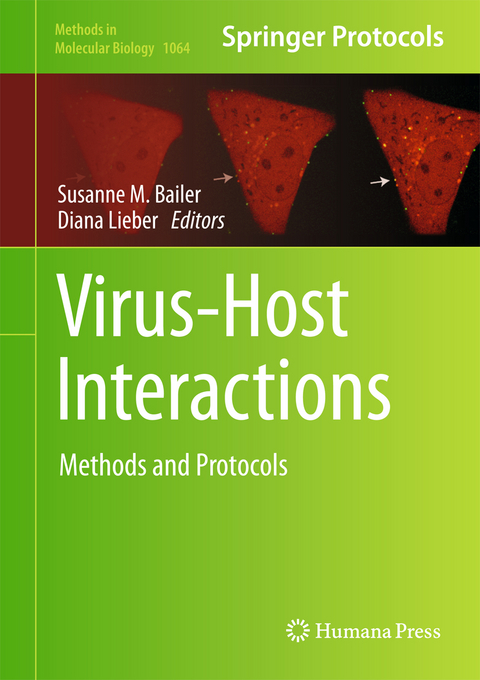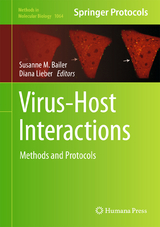Virus-Host Interactions
Humana Press Inc. (Verlag)
978-1-62703-600-9 (ISBN)
Virus-Host Interactions: Methods and Protocols covers various aspects of virological research, such as biochemical approaches, including molecular interactions and regulatory mechanisms on the protein as well as the RNA level with a strong focus on the manifold possibilities to study protein-protein interactions, as well as cell biological and immunological methodologies. Viruses represent a reduced form of life that depends on host cells for propagation. To this end, viruses approach and penetrate cells and usurp cellular machineries for their own benefit. Recent technological improvements have enabled the systematic analysis of the virus-host interplay be it on the genomic, the transcriptomic, or proteomic level. In parallel, bioinformatic tools have emerged in support of the large datasets generated by these high-throughput approaches. Written in the successful Methods in Molecular Biology series format, chapters include introductions to their respective topics, lists of the necessary materials and reagents, step-by-step, readily reproducible protocols, and notes on troubleshooting and avoiding known pitfalls.
Authoritative and easily accessible, Virus-Host Interactions: Methods and Protocols will prove invaluable to professionals and novices with its well-honed methodologies and protocols.
A High-Throughput Yeast Two Hybrid Protocol to Determine Virus-Host Protein Interactions.- Analysis of Protein-Protein Interactions Using LUMIER Assay.- Detection of Protein Interactions During Virus Infection by Bimolecular Fluorescence Complementation.- Discovery of Host-Viral Protein Complexes During Infection.- Screening for Host Proteins with Pro- and Antiviral Activity Using High-Throughput RNAi.- High Resolution Gene Expression Profiling of RNA Synthesis, Processing and Decay by Metabolic Labelling of Newly Transcribed RNA using 4-thiouridine.- Isolation and Characterization of Pathogen-Bearing Endosomes Enables Identification of New Cellular Cofactors and Analysis of Endosomal Escape.- Computational Analysis of Virus-Host Interactomes.- Interspecies Heterokaryon Assay to Characterize the Nucleocytoplasmic Shuttling of Herpesviral Proteins.- Detection of Integrated Herpesvirus Genomes by Fluorescent in situ Hybridization (FISH).- Fast Generation of Stable Cell Lines Expressing Fluorescent Marker Molecules to Study Pathogen Induced Processes.- Determination of HSV-1 Infectivity Using a Luciferase Reporter Cell Line.- Generation of a Cell Line for Constitutive Expression of Host or Viral miRNAs.- Applications for a Dual Fluorescent Human Cytomegalovirus in the Analysis of Viral Entry.- High Temporal Resolution Imaging Reveals Endosomal Membrane Penetration and Escape of Adenoviruses in Real-Time.- Three-Dimensional Visualization of Virus Infected Cells by Serial Sectioning - An Electron Microscopic Study Using Resin Embedded Cells.- 3D Tissue Model for Herpes Simplex Virus-1Infections.- In vivo Visualization of Encephalitic Lesions in Herpes Simplex Virus Type 1 (HSV-1) Infected Mice by Magnetic Resonance Imaging (MRI).- Detection of Antigen-Specific T Cells Based on Intracellular Cytokine Staining Using Flow-Cytometry.- Functional NK Cell Cytotoxicity Assays Against Virus Infected Cells.- Assessment of Natural Killer Cell Responses to Human Cytomegalovirus Infected Macrophages.- Analysis of Cell Migration During HCMV Infection.- Gene Targeting in Mice: A Review.- A Protocol for Construction of Gene Targeting Vectors and Generation of Homologous Recombinant ES Cells.- Measurement of Mouse Cytomegalovirus Induced Interferon-β with Immortalized Luciferase Reporter Cells.
| Erscheint lt. Verlag | 1.9.2013 |
|---|---|
| Reihe/Serie | Methods in Molecular Biology ; 1064 |
| Zusatzinfo | 45 Illustrations, color; 21 Illustrations, black and white; X, 372 p. 66 illus., 45 illus. in color. |
| Verlagsort | Totowa, NJ |
| Sprache | englisch |
| Maße | 178 x 254 mm |
| Themenwelt | Medizin / Pharmazie ► Medizinische Fachgebiete ► Mikrobiologie / Infektologie / Reisemedizin |
| Studium ► Querschnittsbereiche ► Infektiologie / Immunologie | |
| Naturwissenschaften ► Biologie ► Genetik / Molekularbiologie | |
| Naturwissenschaften ► Biologie ► Mikrobiologie / Immunologie | |
| ISBN-10 | 1-62703-600-8 / 1627036008 |
| ISBN-13 | 978-1-62703-600-9 / 9781627036009 |
| Zustand | Neuware |
| Haben Sie eine Frage zum Produkt? |
aus dem Bereich




